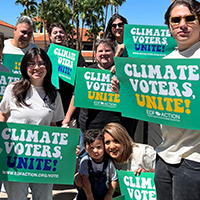The Scott Pruitt Dictionary: What to look for in his testimony this week
Scott Pruitt is well-practiced. When he speaks, he does so by relying on ready-made talking points intended to obfuscate and soften his animosity for the agency he leads.
On Thursday, Dec. 7, we can expect another dose of Pruitt’s slippery language and clever phrasing. That’s when he finally returns to Capitol Hill to testify before the House Energy and Commerce Committee about his priorities for the U.S. Environmental Protection Agency.
It will be the first time he goes before a congressional oversight committee since his confirmation hearings in January. Since then, Pruitt has waged a full-fledged and unprecedented assault on the EPAand the critical public health and environmental safeguards it provides – though you’d never know it from what he says.
Here are a few key entries from the Pruitt Dictionary to help you navigate the EPA chief’s congressional testimony.
“Back to Basics”This phrase is Pruitt’s bread and butter. Indeed, the “basic” function of the EPA is to protect people and the environment
Except, under Pruitt the agency faces deep potential budget cuts that would cripple its ability to do just that. Programs that keep our air and water clean, clean up toxic waste sites, and prosecute polluters are all on the chopping block in his budget proposals, which are now being considered by Congress.
Those are the basics and Pruitt is looking to hamper the agency’s ability to deliver them. He just won’t say so.
“We can do both”Here, Pruitt claims that we can grow jobs while serving as good stewards of the environment, and he’s right.
Expert economists and environmentalists across party lines agree we can grow the economy while serving as good stewards of the environment – that “we can do both,” in other words.
However, Pruitt likes to act as though this is a novel idea and he uses the rhetoric frequently – while ignoring the fact that our economy is already trending toward “doing both.”
The two fastest-growing occupations in America today are solar photovoltaic installers and wind turbine service technicians – parts of a booming renewable energy industry that shows no sign of slowing down. Leading brands such as Google, Apple, Microsoft and Walmart have committed to growing their sustainability efforts, all while making massive profits.
Of course, when Pruitt is talking about “doing both,” he’s referring to coal jobs which he claims he’s bringing back at record numbers. The truth is, coal jobs have declined 60 percent since 1980, and evidence suggests that coal’s share of our energy mix will continue to decline.
Pruitt is, in fact, hurting the people he’s promised to help. There have been reports showing that unemployed workers in coal country are now turning down job training because they believe their jobs are coming back.
“Bureaucrats”Pruitt’s disdain for legitimate professionals and experts is apparent and it’s doing serious damage to the EPA. A recent fiat prohibited individuals receiving research funding from the agency from serving on its Science Advisory Board.
In Pruitt’s dictionary, a “bureaucrat” is someone who bases his or her ideas on sound science and reason.
Career EPA professionals are regularly ignored as Pruitt questions the validity of his own experts. Instead, he spends his time meeting with industry executives, often implementing favorable rulings to cozy companies shortly after talks.
He’s also stacked his administration with an all-star team of polluters and industry insiders. Ex-chemical lobbyists, climate change deniers, and dirty energy allies have infiltrated the EPA at its highest ranks or await confirmation by the Senate.
“Red team/Blue team”The EPA chief continues to advocate for a “red team/blue team” exercise that would pit climate scientists against people seeking to debunk the established science. But the exercise is a reality show designed to confuse the public.
Credible scientists would be peppered with questions from fringe theorists. Facts confirmed by thousands of experts based on decades of evidence will be put up against what amounts to conspiracy theories from the dark corners of the internet.
It would be laughable to knowledgeable experts, but the millions who don’t have expertise will be left confused. And that’s Pruitt’s real goal.
“Power to the states”Pruitt fashions himself a federalist, arguing that states know their problems best.
And yet he’s moved to gut funding that allows states to allocate federal money to fix their most pressing problems. What’s more, states cannot control nor regulate the pollution that crosses state lines, leaving some states to clean up for bad actors in other states.
Except, Congress gave the EPA the responsibility to keep our air, water and land clean. If the agency doesn’t, it’s ignoring the law.
When Pruitt says “power to the states,” he’s really telling states that their taxpayers are on the hook to pay for compliance measures. If a state chooses not to comply, the burden will be placed on the sick.
That would be children, the elderly and at-risk communities that rely on public health protections to keep them safe. Hardly what Congress intended when it empowered the EPA nearly half a century ago.
This blog first appeared on EDF Voices


